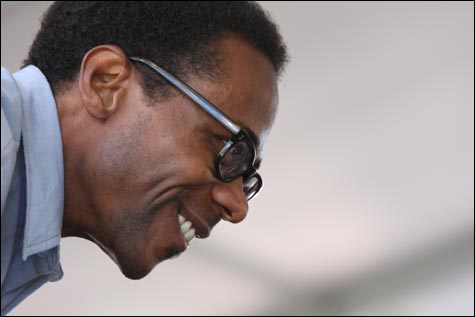
FREESTYLING: Blade’s Fellowship Band has no trouble mixing Joni Mitchell with their Coltrane. |
Jazz Brunch Top 5
1. Jimmy Herring, Lifeboat [Abstract Logix]
2. New York Electric Piano, King Mystery [Buffalo Puppy]
3. Danilo Pérez/Claus Ogerman, Across the Crystal Sea [Emarcy]
4. E.S.T., Leucocyte [Emarcy]
5. Richard Bona, Bona Makes You Sweat [Blue Note] |
The jazz tide is shifting once again. Over the past 40 years, wave after wave of the avant-garde, jazz-rock fusion, and funk has broken and been absorbed. But in the last decade or so, yet another concept of jazz has begun to take in the pop music of our time.It’s easier to define this music by what it isn’t than by what it is. It has no special allegiance to 4/4 swing — the walking-bass and dotted-rhythm ride-cymbal patterns that, along with ballads and brushes, irritate so many rock fans. Neither is there the core of Great American Songbook 32-bar standards that serve as the food for typical jazz ideas about form and harmony. There’s little of the cross-currents of Africa and Stockhausen and Cage that have influenced the avant-garde. There’s not even a lot of blues.

Instead, there’s Joni Mitchell and Radiohead and Björk. (Travis Sullivan’s Björkestra even specialize in the Icelandic chanteuse as big-band jazz.) The Bad Plus appropriate everything from Queen and Black Sabbath to Neil Young and Nirvana. Even when jazz musicians aren’t actually covering these artists, they’re listening hard. Brad Mehldau’s 2002 Largo (Warner Bros.) and Kurt Rosenwinkel’s 2003 Heartcore (Verve) were benchmarks, both in musical content and in the use of pop studio production techniques. On his recent Invisible Cinema (Blue Note), pianist Aaron Parks (a Rosenwinkel bandmember) offered a couple of originals that could have come right out of the Radiohead playbook. In this context, “real” jazz can sound strange. At a Bad Plus show a couple of years ago, I remember hearing — a good 40 minutes into the set —something strangely familiar from pianist Ethan Iverson. The friend who was sitting with me — a jazz pianist — leaned over and whispered, “That’s the first jazz chord they’ve played tonight.”
One of the outfits quietly blazing a path is Brian Blade’s Fellowship Band, who’ll be at Scullers for two shows on November 6. Now 38, Blade has been a comer for years, since his work in the ’90s with Kenny Garrett and Joshua Redman. His sensitivity and fluid sense of time were soon in great demand, going against the grain of the tight, funk-inflected playing of the time. “No one plays like this anymore,” a drummer friend of mine marveled as we watched Blade perform with Redman at a Boston convention of the International Association of Jazz Educators. “He sounds like Elvin.” For the past eight years, Blade has been a member of Wayne Shorter’s acoustic quartet. It doesn’t get more jazz than that.
But he’s also recorded with Bob Dylan, and he’s a regular partner with Dylan producer and guitarist Daniel Lanois. And over the past 10 years, he’s released three albums with his Fellowship Band, whose core is Blade and keyboardist Jon Cowherd, who do all the writing, but also bassist Chris Thomas and reedmen Myron Walden and Melvin Butler, all of whom have been there since the beginning. Rosenwinkel, meanwhile, has been on board for the past two albums.
Like others in jazz’s current wave, the Fellowship like folk harmonies out of Joni Mitchell — she even sings a song on its second album. This is a band of stellar soloists who don’t particularly care about solos — at their Newport festival set last summer, nearly a half-hour passed before I heard anything I’d call an improvised jazz solo. The through-composed aspect is especially true of Cowherd’s writing, which favors unfolding narratives as opposed to repeating cycles of 12- or 16- or 32-bar chord patterns. In its leaning on folk pop, its open-hearted romanticism, and its disregard for orthodoxy, the Fellowship’s music is the freshest jazz sound since Pat Metheny blew in from Missouri 30 years ago.
On the new Season of Changes (Verve), Cowherd’s 12-minute title track extends from its free-tempo somber chorale-like piano introduction to a repetition of the theme in the horns, then to a broad, up-tempo fanfare with a hard backbeat that introduces a secondary theme. Solos are arrayed across varying rhythmic and harmonic backdrops, from Rosenwinkel’s soaring, majestic statement to Butler’s contrasting ruminative phrases over a tertiary theme, and Walden’s testifying over a vamp. Finally, the piece settles back into the original chorale. It sounds like a pop song opened out and expanded for jazz band. Blade’s “Stoner Hill,” meanwhile, is a beautiful slow AABA folk theme repeated in various combinations of instruments with contrasting loud and soft dynanimcs and no improvised solos.